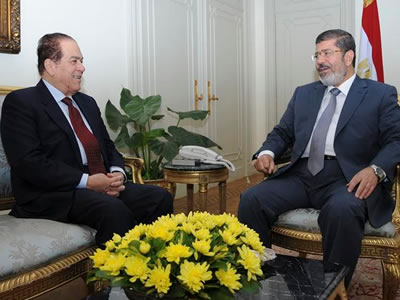Egypt’s parliamentary speaker said the chamber would reconvene on Tuesday, risking a showdown with the army after the new, president defied the generals by quashing the dissolution of the legislature they had ordered last month.
Quoted by the state news agency on Monday, Saad al-Katatni, who like President Mohamed Mursi hails from the long-suppressed Muslim Brotherhood, said the lower house would sit from noon on Tuesday, overturning a court judgment and military order issued a month ago, before Mursi’s election.
The move, heralded by a decree issued by Mursi on Sunday, barely a week after he took office, threatens Egypt with fresh political uncertainty likely to take a toll on a fragile economy and dash the hopes of many desperate for a period of calm after 17 turbulent months since the overthrow of Hosni Mubarak.
However, in a signal that relations have far from broken down between Mursi and the army, the president and the head of the military council appeared together, looking relaxed and in conversation, at a televised event on Monday.
The military council which had run Egypt since Mubarak was toppled by popular protests in February 2011 handed powers to Mursi on June 30, but it had sought to trim his authority shortly before he took office following a June 16-17 vote.
It had dissolved parliament and taken legislative power for itself.
Yet in a move that seemed to take even the generals by surprise, Mursi said on Sunday he was recalling parliament and would hold an election once a constitution was in place, meaning the parliament would not serve a full four-year term.
The row is part of a broader power struggle which could take years to play out, pitting long suppressed Islamists against generals whose fellow officers ran Egypt for six decades and an establishment still packed with Mubarak-era officials.
But the immediate impact may be to make it more difficult for the president to stabilise an economy fast heading towards a balance of payments and budget crisis.
The stock market reacted to Sunday’s news by plunging more than 5 per cent at the open.
“Early confrontation,’’ wrote Al-Akhbar newspaper, summing up a decision which could end a brief honeymoon with the military council, led by Field Marshal Hussein Tantawi.
Yet Mursi and Tantawi showed no hint of discord on Monday when the president, as he did last week, attended a military parade.
Seated next to each other, Mursi and Tantawi turned to each other in a brief jovial exchange, live television images showed.
And in a possible signal that the generals would not openly challenge Mursi, the state news agency reported that guards at parliament allowed some members back into the building after it had been declared off limits when the army ordered it dissolved.
Some analysts said Mursi’s decision to order early elections could offer a compromise by acknowledging the court’s assertion that the election to the chamber breached some legal rules.
But even if the army does not seek an open row, Mursi could be setting himself on a course for confrontation with liberal and other politicians and the judiciary.
“The decree is overturning a state where the rule of law reins. I advise you, Mr. President, to withdraw it because you swore to respect the law and the constitution,’’ Egyptian rights activist Hafez Abu Saeda said. (Reuters/NAN)



